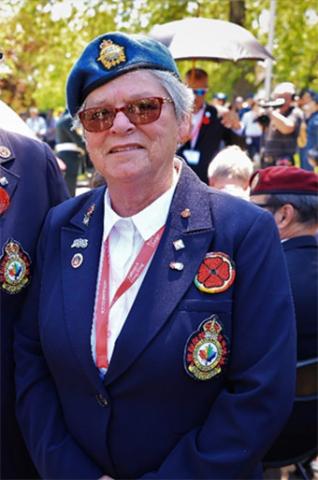
Joined
1977
Air Frame Technician
Supply Technician
She had been dismissed after a painful three-year investigation into her sexuality culminated with her Captain ripping up her promotion papers, throwing them in the trash, turning his back on her and telling her she was a “disgrace to the uniform.” The humiliating experience became a painful decades-long secret for her. “I never told anybody because (I was told) I'm a disgrace. I'm a security threat. For years, I just kept all the stuff for myself,” she explained.
“I was afraid if I told (my family) I would lose them like I lost my career.”
Thirty-eight years later, Pitre invited her family to attend a screening of “The Fruit Machine” – a 2018 documentary of survivors of the purge of 2SLGBTQI+ service members from Canada’s military and public service between the 1950s to 1990s. In the film, she recounts the harrowing interrogations she endured – and the night she was drugged and sexually assaulted by a fellow soldier who told her she needed to “know what it was like to be with a man.”
After the film ended she stood on a stage and answered questions.
“I remember seeing them just staring at me. And they’re saying ‘Why wouldn't you tell us?’
Pitre, who had always admired her uncles for their military service, joined the forces in November of 1977 after graduating high school in Campbellton, N.B. She completed basic training at CFB St. Jean and was posted to CFB Chatham, N.B. in February 1978 for training as an Air Frame Technician. On 1 April 1978, she was posted to CFB Borden, Ontario to complete her Air Frame technician training and returned to CFB Chatham in August, 1978. She was re-trained as a Supply Technician in late 1978 after she lost her security clearance on “suspicion of being a homosexual.”
They told her she was a threat to her country because of her sexuality. “At 19 years old, it's pretty hard to digest that,” she said.
“I remember being so hurt because I so wanted to wear that uniform. I still would wear the uniform today.”
While she was under investigation, Pitre was told if she wanted to stay in the military, she would have to “keep her nose clean.”
She became reclusive, taking her dinners to her room to avoid other soldiers in the mess hall. “I became an introvert. They called me antisocial on the base because I would go do my work. I would go to the store. I would go to my barracks. That was it,” she said.
“I didn't want to associate with anybody because I wanted my career.”
During her three-year service she spent as much time being interrogated and seeing psychiatrists as she did working.
Her work reports were always glowing, higher ranking soldiers deeming it “excellent” in written reports.
Despite this, on September 24, 1980 she was purged from the Armed Forces under the Canadian Forces Administration Order 19-20 “Sexual Deviation – Investigation, Medical Investigation, and Disposal for being a homosexual”. “I felt ashamed. As a child, I wanted to serve my country, my uncles were Veterans, and I just knew that that's what I wanted to do,” she said.
“It's like unfinished business. It's like you're going on a path and you're pushed to something else.”
Her next path led to a successful 30-year career with Canada Post and a lot of advocacy work.
As she began to share her story, her feelings of isolation began to change into feelings of camaraderie and friendship with other 2SLGBTQI+ Veterans. Hearing about others’ experiences is difficult, even 44 years later, she said.
“It never goes away. I've done therapy, I still do therapy.” “So many will contact me for help and tell me their story. And then it comes back - I relive my story.”
Pitre went on to spend the next four decades lobbying the government for an apology for the wrongful dismissal of her and other 2SLGBTQI+ Veterans.
On 28 November 2017, Prime Minister Trudeau made that apology.
Pitre is now a founder and co-chair of Rainbow Veterans of Canada. In March 2023, she received the Minister of Veterans Affairs Commendation for her work educating and advocating for the rights, benefits, and recognition for 2SLGBTQI+ Veterans in Canada.
“What it means to me is I'm a Veteran,” she said.
Her most recent (and one of her proudest) accomplishments is the creation of a Rainbow Veterans’ Heraldic Badge. In November 2023, she received a call letting her know His Majesty King Charles had approved the use of the Crown on the new Rainbow Veterans of Canada badge. They are the first 2SLGBTQI+ organization to receive the honour of using the Royal Crown and one of the first in Canada to use the new Canadian Royal Crown.
It was important to Pitre that LGBT Purge survivors, many of whom never considered themselves Veterans, had a military crest.
“It’s surreal. It was like the King of England actually told me that you can use my Crown. We did feel for the longest time that we weren't Veterans.”
Things are moving in the right direction and wrongs are slowly being righted, she said.
“They wanted to change who I was. And you can't change. It is who you are,” she said. “The only way I started to deal with it is seeing things happen for a reason. So I guess I was meant to help other Veterans.”
With courage, integrity and loyalty, Diane Pitre is leaving her mark. She is one of our Canadian Armed Forces members. Discover more stories.
The well-being of Canadian Veterans is at the heart of everything we do. As part of this, we recognize, honour and commemorate the service of all Canadian Veterans. Learn more about the services and benefits that we offer.
If you are a Veteran, family member or caregiver the support of a mental health professional is available anytime at no cost to you. Call 1-800-268-7708.

